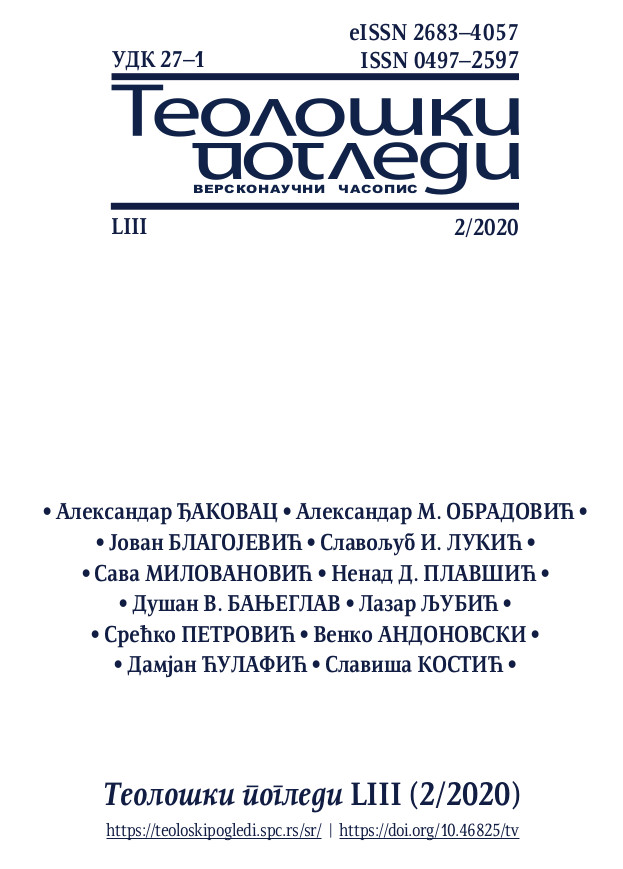Етнофилетизам и верски екстремизам
Ethnophyletism and Religious Extremism
Author(s): Sava MilovanovićSubject(s): Politics and religion, Studies in violence and power, Eastern Orthodoxy, Sociology of Religion
Published by: Свети Архијерејски Синод
Keywords: Ukrainian Orthodox Church; nationalism; nation; Bulgarian Exarchate; fundamentalism
Summary/Abstract: In order to adequately understand the presence of the motives of the ideology of ethnophiletism in contemporary ecclesiastical crises and religious extremism often related with those crises, it is necessary to evaluate the phenomenon of ethnophiletism from the point of view of the sacramentally based Church tradition. The focus of this paper will be the presence of ethnofiletistic ideology in the nationalistic projects of Ukraine and Montenegro. The obscurity of the definition of a nation is one of the factors of abuse of the concept of national identity in ecclesiastical-identity revolutions. This is why this work aims to put the notion of the nation in the context of a Christian understanding of the relationship of God with man. From the biblical aspect, ethnicity is blessed diversity from which the Holy Spirit in the bosom of the Church, in which there is no “Judean or Hellen” (Gal. 3, 26), creates the harmony of unity. The establishment of the Bulgarian exarchate on an ethnic rather than a territorial basis, before the founding of an independent Bulgarian state, is a precedent unknown in the two-millennium Church tradition. Our complete research of the problem of ethnophiletism has shown that this is an ecclesiological anomaly, from the aspect of the Church canonical tradition. The synthesis of the national and the ecclesiastical, in many aspects spiritually useful and gorgeous, also had negative consequences in the form of a deviations in church organization. Despite the canonical incompatibility of the independent establishment of a church on an ethnic basis, this model was later applied in other countries: the canonicity was sacrificed for the autocephaly, with the hope that the time, as in the case of the Bulgarian exarchate, would lead to the subsequent legalization of acts originally characterized by the fullness of the Orthodox Church as uncanonical. In doing so, secular government supports paraeclesiastical organizations while the Mother Church is seen as an instrument of the political influence of the aggressor and the main factor of disruption of national independence and security. Indicative examples are the ecclesiastical crisis in Ukraine and Montenegro. The drastic change in geopolitical circumstances at the beginning of the 1990s led to the disintegration of the USSR and thus to the realization of the idea of independent Ukraine in 1991. Further development of events has largely determined the present-day church crisis. The new authorities supported the split, officially named the “Ukrainian Orthodox Church of the Kiev Patriarchate” (UPC KP), in its attempts to break any connection with the Moscow Patriarchate, emphasizing it as a project of essential national significance. Prosecution of priests and believers, seizure of temples, and the prevention of normal functioning of the canonical Ukrainian Orthodox Church (of Moscow Patriarchate) have not encountered a sanction but rather the support of the secular authorities. In spite of the distinctively Serbian character of the Orthodox Church in Montenegro, separatists established a committee in 1990 to restore the autocephalous “Montenegrin Orthodox Church”. This “Church” found its leaders in former schismatic Antoni Abramović and the priest under ban Miraš Dedeić, which was met with condemnation from canonical Orthodox churches. The disruption of the integrity of the Serbian Church in Montenegro was strengthened by the victory in the 1997 election of separatist Milo Đukanović, who opened the path to the nationalistic organization of “Montenegrin Orthodox church”. The regime financing and support of projects of imaginary churches, which are regarded as indispensable elements in the process of establishing national sovereignty in the case of Ukraine and Montenegro, combined with drastic obstruction of the canonical churches in their religious activity, give these basically ethnophiletistic movements a connotation of institutionalized extremism.
Journal: Теолошки погледи
- Issue Year: LIII/2020
- Issue No: 2
- Page Range: 419-440
- Page Count: 22
- Language: Serbian

